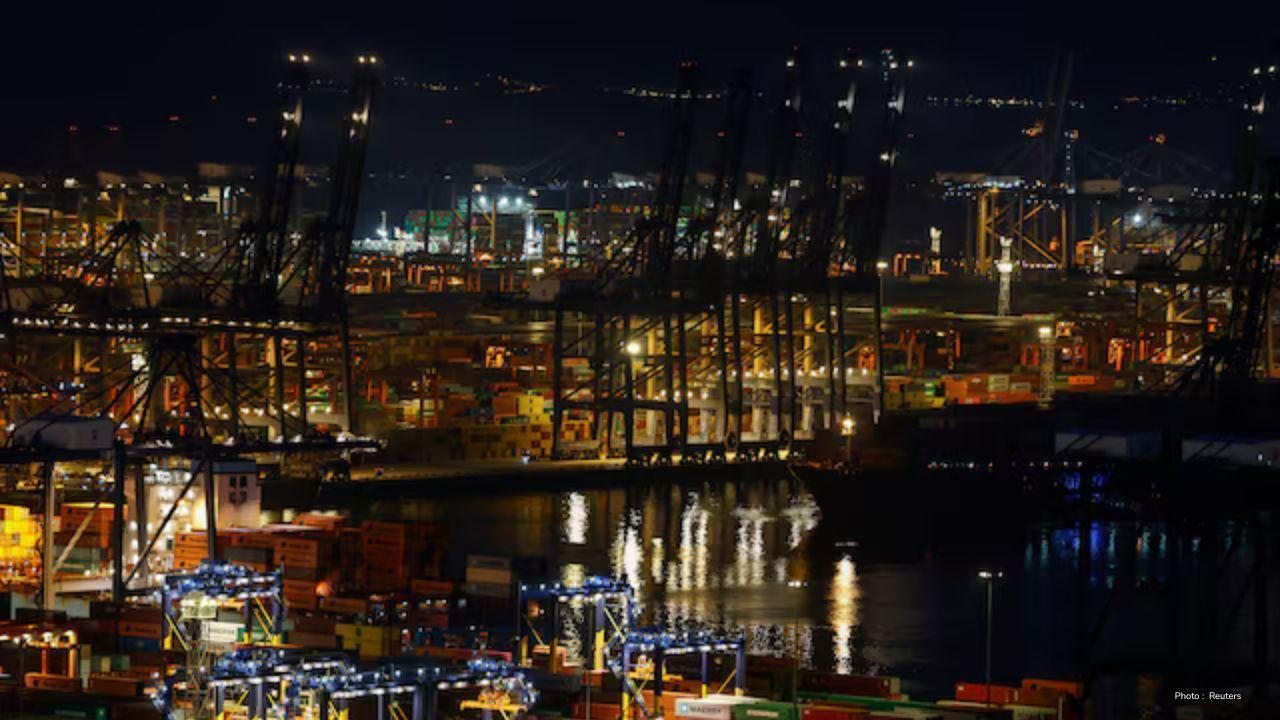
Post by : Saif Ali Khan
Beijing/Los Angeles, October 11, 2025 – China has announced that it will impose new port fees on U.S.-owned, operated, built, or flagged vessels starting Tuesday, October 14, 2025. This decision is a direct response to the United States imposing similar fees on ships linked to China from the same date. The move marks the latest escalation in trade tensions between the two economic giants.
China’s transport ministry explained that the fees will also apply to ships operated by companies with 25% or more ownership or board representation by U.S.-based investment funds. Analysts note that this wide application could affect many public shipping companies listed on U.S. stock exchanges, potentially impacting global shipping operations.
“This casts a wide net and could affect many public shipping companies,” said Erik Broekhuizen, a marine research and consulting manager at ship brokering firm Poten & Partners. He added that the potential impact of these fees is significant for both shipping operations and trade flows.
The United States will simultaneously start charging port fees on ships built, operated, or owned by Chinese entities when they arrive at U.S. ports. This means that some vessels could end up paying fees in both China and the U.S., further complicating global shipping logistics.
Shipping companies are already adjusting to these new measures. U.S.-based Matson (MATX.N) informed its customers that it will comply with the Chinese port fees but does not plan to change its service schedule. Other companies likely affected include CMA-CGM’s American President Lines and Israel-based Zim, as both have significant U.S. ownership. Analysts also expect some large oil tanker operators to face fees due to their U.S. listings.
The impact is expected to be broad across different types of vessels. Analyses by shipping research firms indicate that nearly 10% of the global very large crude carrier fleet, 13% of Suezmax, Aframax, and LR2 tankers, and 10% of liquefied petroleum gas (LPG) supertankers could face China’s port fees. These changes have already created uncertainty in shipping schedules and pricing, especially for tankers currently en route to China.
Experts warn that the fees could lead to higher shipping costs and disruptions in international trade. Many companies rely on predictable port fees to manage their operations, and sudden increases could affect supply chains, especially for energy, manufacturing, and agricultural goods.
This escalation follows a broader series of trade and export restrictions. Earlier, U.S. President Donald Trump announced plans to raise tariffs on Chinese exports to the U.S. to 100% and impose controls on critical software exports in response to China’s restrictions on rare earth mineral exports. Analysts say these moves are part of a growing cycle of trade retaliation that could affect global markets and international relations.
Shipping companies, investors, and governments are closely monitoring these developments. Industry experts suggest that companies may need to adjust routes, contracts, and pricing strategies to cope with the new costs. Some shipping analysts also warn that prolonged trade tensions could slow down global economic growth and increase uncertainty for importers and exporters alike.
In summary, China’s imposition of port fees on U.S. vessels is more than a routine administrative measure. It is part of a larger geopolitical and economic struggle between the two largest trading nations. While only a small number of U.S.-flagged ships are involved, the indirect effects on companies with U.S. investment or public listings could be wide-reaching.
MiddleEastBulletin will continue to follow this story, reporting on developments in trade, shipping, and global economic impacts as tensions between the United States and China unfold.
#trending #latest #China #USA #TradeWar #ShippingFees #MiddleEastBulletin #GlobalTrade #Economy #PortFees










Lazio Denies Qatari Sale Rumors, Files Legal Complaints
Lazio refutes online claims of Qatari takeover talks, files reports with Italian regulators and judi

Penn State Fires Coach Franklin After Third Straight Loss
Penn State parts ways with James Franklin after 3 conference defeats, naming Terry Smith as interim

Denmark Beats Greece 3-1 to Stay Top in Qualifiers
Denmark wins 3-1 at home over Greece, keeps unbeaten record, and stays ahead of Scotland in Group C

Panthers Edge Cowboys 30-27 with Dowdle’s Big Game
Rico Dowdle dominates former team with 239 total yards as Panthers win 30-27 over Cowboys by last-se

Mariners Beat Blue Jays 3-1 to Win ALCS Game 1
Seattle shuts down Toronto’s bats and wins Game 1 of the ALCS 3-1, with strong pitching and timely h

Dutch Government Seizes Control of China-Owned Chipmaker Nexperia
The Netherlands government steps in over governance risks at Nexperia, suspends its Chinese parent’s